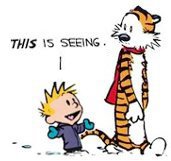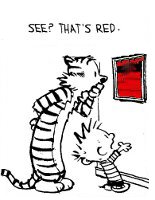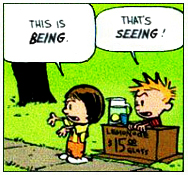Seeing and being
Preface
 This is an essay on the “hard problem” of consciousness. If we focus on visual consciousness for simplicity, this is often said to be the problem of explaining how the everyday phenomenon we call seeing “arises” from the brain. But I have never liked this way of phrasing the problem because it strikes me that we have a poor grasp (to begin with) of the everyday phenomenon of seeing itself. —What is this thing we call seeing? So, in the essay, I explore instead the prior question of what we suppose the everyday phenomenon of seeing even to be—a question just as hard, but one which I find to be considerably more fruitful. And the only decent answer I can come up with suggests that a certain form of “neutral monism” may be the true relation between mind and body. Written in 2014.
This is an essay on the “hard problem” of consciousness. If we focus on visual consciousness for simplicity, this is often said to be the problem of explaining how the everyday phenomenon we call seeing “arises” from the brain. But I have never liked this way of phrasing the problem because it strikes me that we have a poor grasp (to begin with) of the everyday phenomenon of seeing itself. —What is this thing we call seeing? So, in the essay, I explore instead the prior question of what we suppose the everyday phenomenon of seeing even to be—a question just as hard, but one which I find to be considerably more fruitful. And the only decent answer I can come up with suggests that a certain form of “neutral monism” may be the true relation between mind and body. Written in 2014.
 This is an essay on the “hard problem” of consciousness. If we focus on visual consciousness for simplicity, this is often said to be the problem of explaining how the everyday phenomenon we call seeing “arises” from the brain.
This is an essay on the “hard problem” of consciousness. If we focus on visual consciousness for simplicity, this is often said to be the problem of explaining how the everyday phenomenon we call seeing “arises” from the brain.
11. The idealist’s concept of seeing
We began by asking what our concept of seeing amounts to – what we take to be “going on” when we see.
Notice that the idealist has no substantive answer to this question because he tends to regard seeing as a “primitive” notion, in terms of which being may be “reduced.” His brief is to reduce matter to mind, while taking the concept of mind itself for granted.
In saying that idealists regard seeing as “primitive,” I mean that they generally provide no explanation of what this concept amounts to, and often give the impression that no explanation is needed. It is as if they consider it sufficient to explain the concept of mind simply to contrast it with matter.
Historically, of course, idealism was introduced as an “antidote” to then-prevailing attempts to “reduce” mind to matter. (I am thinking of Berkeley here.) It was generally assumed that the concepts of mind and matter were “well-enough” understood – the substantive question concerned the relation between the two. This may partly explain why, given the startling idealist doctrine that it is matter that may in fact be reduced to mind, the further issue of what mind, in turn, was was never vigorously pursued.
In any case, the idealist often behaves as if no real analysis of seeing is either possible or necessary. To this extent, he cannot help us clarify the concept of seeing. Nevertheless, he can help us in another way, for I do think that something is right about the manner in which he tries to “reduce” matter to mind – or being to seeing, in our terms. More specifically, his central insight into the relation between being and seeing – which I wish to preserve – seems to me marred only by his decision to treat seeing as primitive. Let me explain this and then offer a simple fix which converts idealism into a position I shall eventually recommend.
It is easy to understand why someone might regard the concept of seeing – more generally, consciousness – as “primitive,” i.e., incapable of substantive elucidation. We saw at the start that there is no obvious way to explain what this “seeing” business comes down to and one might easily seek refuge in the thought that we know what it is, after all, from “personal experience.” As noted, one can feel like raising one’s hands aloft and declaring, “This is seeing!”
From all appearances, this is pretty much how the idealist proceeds. He regards seeing (hearing, feeling, etc.) as something that we grasp “well-enough” from personal acquaintance and seeks primarily to explain how we can construct the physical world out of this mental scaffolding. As mentioned, the manner in which the idealist “reduces” being to seeing seems to me genuinely insightful, but I also think that we can preserve the essential conceptual link here without needing to regard the concept of seeing as primitive. Let me first explain why I think it is a bad idea to treat the concept of seeing in this way.
One reason is simply that it seems unlikely that the concept of seeing should prove ultimately to be primitive. For example, we saw above that seeing is sensibly regarded as a form of knowing, which means that it can be unravelled to at least the extent that the concept of knowing can. But not many people would say that the concept of knowing is a primitive one, incapable of substantive analysis.
But even discounting the connection with knowing, treating seeing as primitive strikes me anyway as being phenomenologically unsound. Thus, an example of a concept which might have some claim to being primitive is the concept of (say) red. It is not unreasonable to hold, as many in fact do, that one cannot grasp what redness is without sensory acquaintance with the colour. That is, it is impossible to “explain” what redness is; the only way to grasp it is to see it for oneself. This take on redness is at least believable, even if it proves to be ultimately incorrect, but the case of seeing seems to be very different in contrast. Even when construed in a phenomenological way, i.e., through “personal acquaintance,” the phenomenon of seeing appears to have too much “structure” in it to have a similar claim to being primitive.
Admittedly, most people would find themselves “lost for words” when asked to explain what seeing is, no less than when asked to explain what redness is. In either case, the “hands aloft” gesture is about all that most people can ultimately manage. But this, by itself, does not show very much. More significant is that most people can at least manage a stab at explicating the concept of seeing – even if they don’t get very far – whereas the concept of redness is apt to draw an immediate blank. This suggests that a certain “structure” is present in the concept of seeing that we vaguely sense, even if we find it difficult to articulate. And this means that the concept cannot fairly be regarded as primitive.
There is an oft-quoted passage in St. Augustine’s Confessions (Book Eleven) which illustrates the same point with respect to the concept of time:
A second (and deeper) reason for declining to regard seeing as a primitive concept turns on a small point of logic. For the idealist, beings are “bundles of seeings,” e.g., as a tree is a bundle of sense experiences. It may then seem natural to hold that seeing is the prior notion, in terms of which being may be reduced. But, of course, if beings are bundles of seeings, then seeings are conversely “twigs” or “slices” of beings. Why not hold then that being is the prior notion, in terms of which seeing may be reduced?
The logical point here is the symmetry of identity. If esse est percipi, then of course percipi est esse, and nothing so far informs us which is the “prior” notion, if any. To a plane geometer, an angle is the entity subtended by two sides of a given figure. This does not mean that the concept of a side is prior to that of an angle because, after all, he could equally have defined a side as an entity, two of which are marked out by an angle. We should rather say that the concepts of side and angle are mutually dependent upon each other.
It seems to me that the idealist is in a similar bind. Recall the diaphanousness of seeing from section 2 above:
Equally, anyone who focuses on the seeing of the tree would, by the idealist’s own lights, simultaneously be focusing on the being of the tree, i.e., a certain cross-section of it. So nothing again tells us here which notion is the primitive one. Nor do I see anything else in the metaphysics of idealism which confers this title upon seeing in particular.
There are things I like about idealism but I see no point in holding that seeing is the primitive notion in terms of which being may be reduced. A better view is that they are ontological equals and definable in terms of one another. A geometer, as we saw, is better understood as cleaving the notions of “angle” and “side” apart from each other, rather than as trying to define the one in terms of the other. I believe that the same is true of “seeing” and “being” – we acquire these notions jointly by cleaving them apart from one another, and not, as both idealism and contemporary forms of materialism would have us believe, by grasping the one of them in terms of the other.
This was indeed the approach suggested by the omnivisual being and I will now explain how I think our ordinary notions of seeing and being are “cleaved apart” from one another, and what each notion thereby amounts to. The position I am about to articulate may be described as a form of “neutral monism,” but this label means different things to different people, so I will mostly let the position speak for itself.
We began by asking what our concept of seeing amounts to – what we take to be “going on” when we see.
Notice that the idealist has no substantive answer to this question because he tends to regard seeing as a “primitive” notion, in terms of which being may be “reduced.” His brief is to reduce matter to mind, while taking the concept of mind itself for granted.
Note. This is the reverse of contemporary forms of materialism, which instead take the concept of being for granted and aim to explain seeing in terms of it. Such materialists, accordingly, tend to offer no substantive explication of the concept of being.
In saying that idealists regard seeing as “primitive,” I mean that they generally provide no explanation of what this concept amounts to, and often give the impression that no explanation is needed. It is as if they consider it sufficient to explain the concept of mind simply to contrast it with matter.
Historically, of course, idealism was introduced as an “antidote” to then-prevailing attempts to “reduce” mind to matter. (I am thinking of Berkeley here.) It was generally assumed that the concepts of mind and matter were “well-enough” understood – the substantive question concerned the relation between the two. This may partly explain why, given the startling idealist doctrine that it is matter that may in fact be reduced to mind, the further issue of what mind, in turn, was was never vigorously pursued.
In any case, the idealist often behaves as if no real analysis of seeing is either possible or necessary. To this extent, he cannot help us clarify the concept of seeing. Nevertheless, he can help us in another way, for I do think that something is right about the manner in which he tries to “reduce” matter to mind – or being to seeing, in our terms. More specifically, his central insight into the relation between being and seeing – which I wish to preserve – seems to me marred only by his decision to treat seeing as primitive. Let me explain this and then offer a simple fix which converts idealism into a position I shall eventually recommend.
It is easy to understand why someone might regard the concept of seeing – more generally, consciousness – as “primitive,” i.e., incapable of substantive elucidation. We saw at the start that there is no obvious way to explain what this “seeing” business comes down to and one might easily seek refuge in the thought that we know what it is, after all, from “personal experience.” As noted, one can feel like raising one’s hands aloft and declaring, “This is seeing!”
From all appearances, this is pretty much how the idealist proceeds. He regards seeing (hearing, feeling, etc.) as something that we grasp “well-enough” from personal acquaintance and seeks primarily to explain how we can construct the physical world out of this mental scaffolding. As mentioned, the manner in which the idealist “reduces” being to seeing seems to me genuinely insightful, but I also think that we can preserve the essential conceptual link here without needing to regard the concept of seeing as primitive. Let me first explain why I think it is a bad idea to treat the concept of seeing in this way.
One reason is simply that it seems unlikely that the concept of seeing should prove ultimately to be primitive. For example, we saw above that seeing is sensibly regarded as a form of knowing, which means that it can be unravelled to at least the extent that the concept of knowing can. But not many people would say that the concept of knowing is a primitive one, incapable of substantive analysis.
But even discounting the connection with knowing, treating seeing as primitive strikes me anyway as being phenomenologically unsound. Thus, an example of a concept which might have some claim to being primitive is the concept of (say) red. It is not unreasonable to hold, as many in fact do, that one cannot grasp what redness is without sensory acquaintance with the colour. That is, it is impossible to “explain” what redness is; the only way to grasp it is to see it for oneself. This take on redness is at least believable, even if it proves to be ultimately incorrect, but the case of seeing seems to be very different in contrast. Even when construed in a phenomenological way, i.e., through “personal acquaintance,” the phenomenon of seeing appears to have too much “structure” in it to have a similar claim to being primitive.
Admittedly, most people would find themselves “lost for words” when asked to explain what seeing is, no less than when asked to explain what redness is. In either case, the “hands aloft” gesture is about all that most people can ultimately manage. But this, by itself, does not show very much. More significant is that most people can at least manage a stab at explicating the concept of seeing – even if they don’t get very far – whereas the concept of redness is apt to draw an immediate blank. This suggests that a certain “structure” is present in the concept of seeing that we vaguely sense, even if we find it difficult to articulate. And this means that the concept cannot fairly be regarded as primitive.
There is an oft-quoted passage in St. Augustine’s Confessions (Book Eleven) which illustrates the same point with respect to the concept of time:
Augustine is largely “hands aloft” here with regard to the concept of time, and most people could probably do no better. For all that, time is no more likely to be a “primitive” concept than seeing is. With suitable effort, the concept of time should admit of some elucidation – one can almost sense this – but I cannot of course attempt this here. Augustine himself has a fair stab at elucidating it in the passages that follow – although he does not get very far – but it is hard to imagine anyone attempting the same for redness. Again, there seems to be a noticeable difference here.For what is time? Who can readily and briefly explain this? Who can even in thought comprehend it, so as to utter a word about it? But what in discourse do we mention more familiarly and knowingly, than time? And, we understand, when we speak of it; we understand also, when we hear it spoken of by another. What then is time? If no one asks me, I know: if I wish to explain it to one that asketh, I know not ...
A second (and deeper) reason for declining to regard seeing as a primitive concept turns on a small point of logic. For the idealist, beings are “bundles of seeings,” e.g., as a tree is a bundle of sense experiences. It may then seem natural to hold that seeing is the prior notion, in terms of which being may be reduced. But, of course, if beings are bundles of seeings, then seeings are conversely “twigs” or “slices” of beings. Why not hold then that being is the prior notion, in terms of which seeing may be reduced?
The logical point here is the symmetry of identity. If esse est percipi, then of course percipi est esse, and nothing so far informs us which is the “prior” notion, if any. To a plane geometer, an angle is the entity subtended by two sides of a given figure. This does not mean that the concept of a side is prior to that of an angle because, after all, he could equally have defined a side as an entity, two of which are marked out by an angle. We should rather say that the concepts of side and angle are mutually dependent upon each other.
It seems to me that the idealist is in a similar bind. Recall the diaphanousness of seeing from section 2 above:
The idealist accounts for this by holding that a tree is just a bundle of sense experiences, which we may restrict to visual experiences, for the moment. This is quite a nice way of accounting for the diaphanousness of seeing. But he could equally have accounted for it by holding that a visual experience of a tree is just a slice (or a cross-section) of a tree.Part of the difficulty is that, in looking at something, and attempting to focus on the fact that we “see” it, we seem to have nothing to focus on except the thing that we see ...... if I look at a tree, and try to focus on the fact that I see the tree, it is difficult to pin down the “seeing” because I seem to have nothing to focus on except the tree. The “seeing” seems to vanish into emptiness, as Moore puts it.
Equally, anyone who focuses on the seeing of the tree would, by the idealist’s own lights, simultaneously be focusing on the being of the tree, i.e., a certain cross-section of it. So nothing again tells us here which notion is the primitive one. Nor do I see anything else in the metaphysics of idealism which confers this title upon seeing in particular.
There are things I like about idealism but I see no point in holding that seeing is the primitive notion in terms of which being may be reduced. A better view is that they are ontological equals and definable in terms of one another. A geometer, as we saw, is better understood as cleaving the notions of “angle” and “side” apart from each other, rather than as trying to define the one in terms of the other. I believe that the same is true of “seeing” and “being” – we acquire these notions jointly by cleaving them apart from one another, and not, as both idealism and contemporary forms of materialism would have us believe, by grasping the one of them in terms of the other.
This was indeed the approach suggested by the omnivisual being and I will now explain how I think our ordinary notions of seeing and being are “cleaved apart” from one another, and what each notion thereby amounts to. The position I am about to articulate may be described as a form of “neutral monism,” but this label means different things to different people, so I will mostly let the position speak for itself.
Menu
 What’s a logical paradox?
What’s a logical paradox? Achilles & the tortoise
Achilles & the tortoise The surprise exam
The surprise exam Newcomb’s problem
Newcomb’s problem Newcomb’s problem (sassy version)
Newcomb’s problem (sassy version) Seeing and being
Seeing and being Logic test!
Logic test! Philosophers say the strangest things
Philosophers say the strangest things Favourite puzzles
Favourite puzzles Books on consciousness
Books on consciousness Philosophy videos
Philosophy videos Phinteresting
Phinteresting Philosopher biographies
Philosopher biographies Philosopher birthdays
Philosopher birthdays Draft
Draftbarang 2009-2024  wayback machine
wayback machine
 wayback machine
wayback machine







